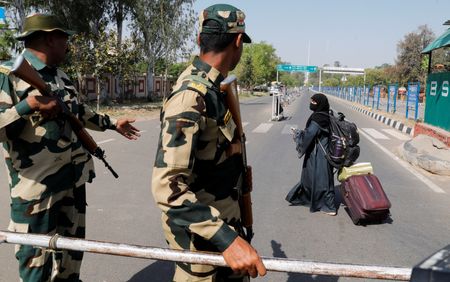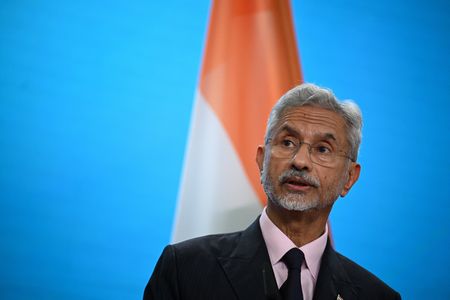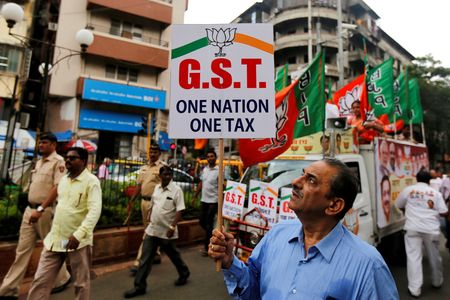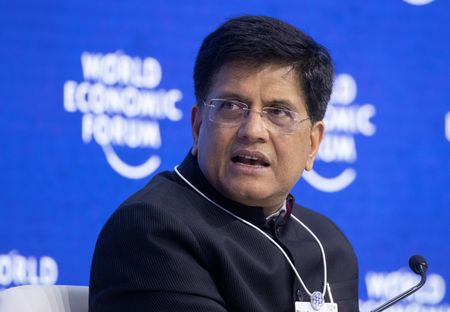By Gibran Naiyyar Peshimam, Shivam Patel and Tanvi Mehta
ISLAMABAD/NEW DELHI (Reuters) -India Prime Minister Narendra Modi said on Tuesday that water that previously was being sent outside the country would now be retained for internal use, days after New Delhi suspended a water-sharing pact with Pakistan.
“Earlier, water belonging to India was also going outside. Now India’s water will flow in its share … and be utilised for India itself,” Modi said while speaking at an event in New Delhi.
He did not elaborate.
Last month, India suspended a 1960 water-sharing pact that ensured supply to 80% of Pakistani farms following an attack in Indian Kashmir that targeted Hindu tourists, killing 26 people. India accused Pakistan of involvement, saying two of the three suspected attackers were Pakistani nationals.
Islamabad has denied the accusation, but says it is fully prepared to defend itself in case of attack, prompting world powers to call for a calming of tension.
The nuclear-armed neighbours have disagreed over use of the water from rivers that flow downstream from India into the Indus River basin in Pakistan.
The Indus Waters Treaty, mediated by the World Bank and signed by India and Pakistan in September 1960, split the Indus and its tributaries between the two countries and regulated water sharing.
New Delhi said last month it would immediately suspend the treaty “until Pakistan credibly and irrevocably abjures its support for cross-border terrorism.”
Pakistan’s foreign ministry did not immediately respond to a request for comment.
Islamabad has threatened international legal action over the suspension. “Any attempt to stop or divert the flow of water belonging to Pakistan … will be considered as an act of war,” it said.
Reuters has reported that India has advanced the start date of four under-construction hydropower projects in the Kashmir region by months as well as begun work to boost reservoir holding capacity at two projects.
CIVIL DEFENCE DRILLS
On Tuesday, Pakistan’s military said members of the Baloch Liberation Army, which it described as an “Indian proxy”, targeted its vehicle with an improvised explosive device in the restive southwestern province of Balochistan.
The BLA is the strongest of a number of insurgent groups operating in the area bordering Afghanistan and Iran.
India’s foreign ministry did not immediately respond to a request for comment on the statement.
Other measures taken by the two countries include suspending trade, closing their airspace and reducing embassy staff.
On Monday, U.N. Secretary-General Antonio Guterres emphasised the need to avoid a military confrontation that could “easily spin out of control”.
Pakistan has held two missile tests in three days and India has unveiled plans for civil defence drills to be conducted in several states on Wednesday, from sounding air raid sirens to evacuation plans.
Pakistan is currently a non-permanent member of the U.N. Security Council. India is not, but New Delhi has been in talks with council members ahead of Monday’s meeting.
An Indian source familiar with the discussion said many members expressed concern that Pakistan’s missile tests and nuclear rhetoric were “escalatory” factors.
On Tuesday, Pakistan’s prime minister, Shehbaz Sharif, along with the deputy prime minister, foreign and defence ministers, and the military chiefs, visited the headquarters of its top ISI spy agency.
Muslim-majority Kashmir is claimed in full by both Hindu-majority India and Islamic Pakistan, although each controls only a part of the Himalayan region. They have fought two wars over Kashmir, and New Delhi accuses Pakistan of backing an uprising in Indian Kashmir that started in 1989 but has now waned.
Pakistan says it only offers diplomatic and moral support to a Kashmiri demand for self-determination.
(Reporting by Gibran Naiyyar Peshimam, Shivam Patel, Saeed Shah and Tanvi Mehta, Writing by Sakshi Dayal; Editing by YP Rajesh, Clarence Fernandez, Ros Russell and Leslie Adler)










